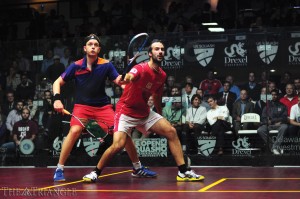 2010 was a pivotal year for the future of Drexel University. President John A. Fry was elected to his position, and it seemed like the construction began almost immediately and the building blocks were put in place to become a world-leading modern university. Little did we know at the time that there were more plans brewing in the athletic department, and the sport of squash would be a major piece of the broader Drexel puzzle.
2010 was a pivotal year for the future of Drexel University. President John A. Fry was elected to his position, and it seemed like the construction began almost immediately and the building blocks were put in place to become a world-leading modern university. Little did we know at the time that there were more plans brewing in the athletic department, and the sport of squash would be a major piece of the broader Drexel puzzle.
Fry has been on the board of directors of U.S. Squash since 2010, and it is a widely known fact around campus that he is an avid fan and player of the sport. When Fry arrived at Drexel, though, squash was an afterthought to many, if it was even a thought at all. Squash was offered as a club sport but was still relatively young, with the men’s team beginning in 2005 and the women’s in 2007.
One year after coming to Drexel, Fry and Director of Athletics Eric Zillmer announced a series of plans that would change how the sport of squash was viewed on Drexel’s campus. Among the plans were a partnership with the local nonprofit organization SquashSmarts, elevating Drexel’s club squash teams to NCAA Division I status with former top-ranked player John White as head coach, building the $1.5 million Kline & Specter Squash Center within the rec center, and applying to host the 2011 Delaware Investments U.S. Open Squash Championships.
Fast-forward to the present, and everything seems to be working according to plan. Drexel and squash have grown up together in the last three years. The University is undergoing a massive redevelopment project that has included the recent openings of Chestnut Square and Gerri C. LeBow Hall.
Meanwhile, squash has been on a meteoric rise of its own. White has taken the program to new heights, and the Squash Center has played host to various squash events in the Philadelphia area, including the U.S. Open Squash Championships, an internationally renowned tournament that Drexel has hosted for the past three years.
Even student involvement in the game is growing, White pointed out. The club team has over 40 players, and recreational use of the new squash courts has far exceeded anybody’s expectations.
“We actually need to build more courts because they’re being used so much,” White joked. “With the U.S. Open and with the courts being built downstairs two years ago, squash at Drexel has really picked up.”
The U.S. Open has really afforded Drexel the opportunity to use the sport to grow. White called it one of the top three tournaments of the professional season. Having the best players in the world use Drexel’s facilities has only helped squash’s reputation at the University.
This year, squash at Drexel took two major steps forward. Fry was named chair of the board of directors for U.S. Squash, and Drexel was announced as the U.S. Open host for the next 10 years.
“We know it’s only going to get bigger and better,” White said of Drexel’s extension as the host of the U.S. Open. “It’s going to help with recruiting. It’s going to help the athletic department.”
White said that Fry and Drexel’s devotion to the sport have helped create a sense of pride across all parts of the campus, and he and his players are grateful for the University’s commitment to squash. While hosting the U.S. Open signifies growth for Drexel’s squash program as a whole, the tournament also offers the players a unique opportunity to grow as individuals and as athletes.
“The whole team is volunteering every day, which is awesome,” White said. “They get to see matches, hang out with the pros, and see how the game should be played. They’re able to hear it and see it, I don’t think any other college has an international event of any sort where team members can see it and volunteer for 10 days.”
Aside from the growth, the U.S. Open is a great fit for the University in terms of its mission. Drexel has long been known in the world of athletics as one of the most gender-equitable universities in the country. Prior to the start of this year’s U.S. Open, it was announced that players would play for the largest purse of prize money in the tournament’s history — $230,000 would be up for grabs, $115,000 each on the men’s and women’s sides. This marks the first time that an international squash tournament is awarding equal prize money to men and women.
The men’s and women’s champions of the 2013 U.S. Open Squash Championships will be decided Oct. 18.
We can be sure that as Drexel looks back on the growth of its squash program over the past three years, it will see great successes. Fry’s plans for the University have led with a little-known sport at the forefront, but if the growth of the squash program is any indication, the next 10 years for Drexel look bright.

